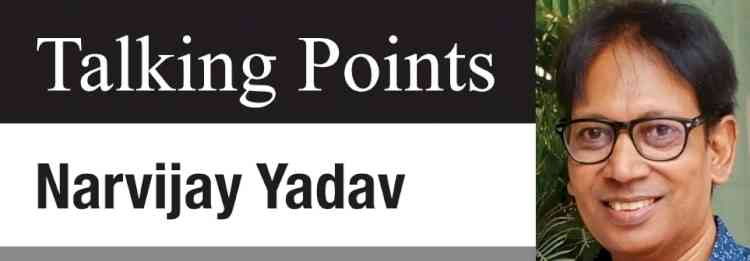Lack of outdoor activities takes its toll on vision
Artificial Intelligence (AI) is spreading rapidly and is becoming more powerful day by day than before. It is the mechanical form of the human brain, with the help of which many functions are being performed through computers, smartphones, and machines.

Artificial Intelligence (AI) is spreading rapidly and is becoming more powerful day by day than before. It is the mechanical form of the human brain, with the help of which many functions are being performed through computers, smartphones, and machines. Innovative applications of AI are emerging one after the other in medical science, computer science, and commercial processes. Your smartphone is called smart because it is powered by AI and the internet, and in the blink of an eye, you can do many impossible tasks with the help of this handy gadget. It is surprising that the smartphone alone has replaced many of the tools and technologies that had existed over the years and thus has changed the lifestyle of people the world over. Now you do not wear a wristwatch to check the time and don't rely on the radio set or a tape recorder to listen to your favorite songs or music. The camera has already disappeared from the scene. The calculator also met a similar fate. The mobile phone alone is doing a lot of work now and behind it is the power of AI. There is so much about AI that no matter how many times it interferes in our lives, there are some things that only humans can do well. Some of these unique functions include creative thinking, empathy, emotional quotient (EQ), and finding solutions to complex day-to-day problems.
Children born in or after 1995 are now in their prime phase and are between the ages of 25 and 30. One thing is very clear in the case of these youths, who are also called Generation Z, that they depend excessively on the Internet. Because of this, while people of the previous generation relied on their memory for multiplication or daily calculations and did most of the counting with their minds, the youth of Gen Z could not walk a step without a smartphone or the Internet. They need calculators for simple addition and subtraction and the Internet for solutions to every problem, big or small. 40 percent of the youth of this generation are those who spend more than four hours on the internet every day and use the internet to make their everyday decisions. This generation maintained contact with the outside world only through the Internet at the time of the Covid pandemic. The period of the lockdown was such that it was not possible to go anywhere and mutual contacts were also broken, in such a situation, from ordering medicines to necessary video or zoom meetings, these youths kept the pace of work.
Generation Z sees the solution to every problem on the Internet and considers it to be the most effective and reliable source of information. With the introduction of different types of apps, their life has become even easier. Whether ordering a pizza at 2 o'clock at the night or booking a flight or a hotel for a weekend outing, everything is done online and with full confidence; so what’s the need to wander elsewhere? The disadvantages of being more online are also coming to the fore, such as one out of every three such youth has a problem with depression, anxiety, or stress. Nevertheless, this generation prefers to participate in all kinds of social or commercial events through social media. To build relationships, this generation also likes people who they have met through online mediums.
No matter how much you use mobile and the internet, living in a natural environment has its own benefits. In many countries in Asia and Europe, 80 percent of school children have been found to have poor vision. Due to modern living and high-calorie food, there were the problems of diabetes, obesity, and heart diseases, but now a problem of vision loss has emerged now. The reason behind this has been that today's children spend most of their time in low indoor light and are less exposed to sunlight outside. The loss of distant vision is called myopia. The problem of myopia remains with the person even at a later age. Such children lag behind in studies and are forced to wear costly contact lenses or eyeglasses. Apart from this, the disadvantages of excessive use of mobile phones are well known. Mobile games like PUBG are making kids violent. Every day such reports come to the fore in which it is told that a child has shot his parents, teacher, or fellow children. One child used to administer intoxicating pills to his parents to play PUBG at night so that they could keep sleeping and the child continued to play violent games on his mobile unabated.
Outdoor sports have many benefits, but there are some indoor activities too which have a good effect on the mind and provide solutions to some medical problems. The drum playing is one such activity that has a medical benefit in addition to music. Recent research conducted at King's College London has shown that drumming can prove to be very useful for children who are suffering from autism and whose brain and other body parts are not in proper coordination. While playing drums, a person's brain, hands, feet all work together, so drumming was shown to improve the physical condition of children having autism. Drumming increases functional connectivity in the brain.
Advertising is of great importance in the market and business. Advertisements serve to provide information for common citizens. That's why people like to watch advertisements on TV or mobile. It often takes a lot of money and effort to create an advertisement that lasts for a few seconds or minutes. The reason is that in a few seconds, the key message has to be conveyed to the audience, which a movie can convey in a couple of hours. But advertising liquor by showing a soda bottle or advertising gutkha by showing cardamom is fraudulent. This is called surrogate advertising, which is done covertly to avoid legal action. The Union Ministry of Consumer Affairs has issued guidelines to check such misleading advertisements.
The writer is a senior journalist & columnist.


 Narvijay Yadav
Narvijay Yadav 








